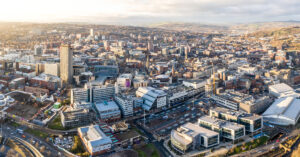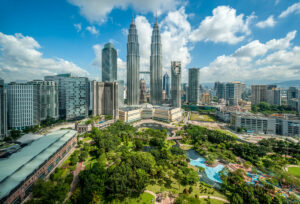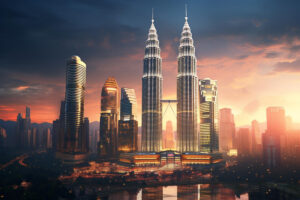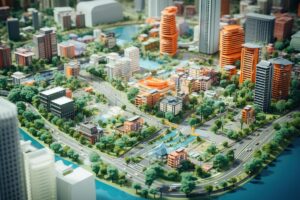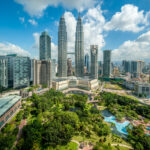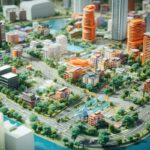In an era of increasing environmental concerns, the importance of urban sustainability cannot be overstated.
As a nation with a forward-thinking approach to urban development, Malaysia is at the forefront of implementing innovative initiatives that prioritise the well-being of its citizens and the future of our planet.
Therefore, in this article, we will explore the urban sustainability initiatives that Malaysia has embraced to create resilient and livable cities.
What is Urban Sustainability?
Urban sustainability in Malaysia encompasses the design and management of cities that meet the needs of present and future generations while minimising harm to the environment, society, and economy.
Achieving this balance involves considering social, economic, and environmental aspects in spatial planning.
Read More: The Role of Urban Design in Increasing One’s Quality of Life
Implementing Urban Sustainability Initiatives in Malaysia

Malaysia is actively implementing urban sustainability initiatives to address the challenges caused by rapid urbanisation and ensure the long-term well-being of its cities and communities. These initiatives include:
Green Building Initiatives
Firstly, Malaysia promotes green building practices through the Green Building Index (GBI) and the Malaysia Green Building Confederation (MGBC).
These initiatives encourage constructing and retrofitting buildings with low energy consumption and environmentally friendly features.
Sustainable Modes of Transport
Next, to reduce traffic congestion and carbon emissions, Malaysia has invested in public transport infrastructure such as Bus Rapid Transit (BRT) systems and buses in major cities like Kuala Lumpur.
Efforts are also underway to encourage cycling and pedestrian-friendly infrastructure.
Waste Management
Furthermore, the government has developed waste management initiatives, including the “Separate Waste at Source” campaign, to support recycling and waste reduction. This encourages communities to separate their waste for recycling.
Low-Carbon Cities
Malaysia also aims to promote low-carbon urban development by integrating green technologies, efficient energy use, and sustainable urban planning through the Low Carbon Cities Framework (LCCF).
Urban Green Spaces
Additionally, efforts have been made to enhance and preserve green spaces within urban areas. For instance, the River of Life project in Kuala Lumpur rejuvenates urban rivers and improves the overall ecological quality of the city.
Climate Adaptation
Malaysia is exploring strategies to adapt to the impacts of climate change, specifically in coastal areas. This involves building resilient infrastructure and implementing flood mitigation measures.
Read More: Climate-Smart Cities in Malaysia: A Response to Climate Change
The Importance of Urban Sustainability in Malaysia

Urban sustainability plays a pivotal role in Malaysia for several reasons, as it directly affects the well-being of current and future generations and the planet’s overall health. Here’s how:
Environmental Protection
Cities are one of the main contributors to greenhouse gas emissions. However, Malaysia can significantly reduce its carbon footprint through sustainable urban planning and development.
Consequently, it will achieve its climate targets and contribute to international efforts to battle climate change. These urban sustainability initiatives help conserve natural resources, preserve biodiversity, and mitigate climate change.
Resilience to Disasters
Moreover, sustainable cities are better equipped to handle natural disasters and climate-related events. By incorporating climate-resilient infrastructure and disaster preparedness measures, Malaysia can reduce vulnerabilities and ensure a swift recovery.
Read More: Mitigating Risks with Disaster-Resilient Cities in Malaysia
Improved Quality of Life
Sustainable urban development also creates healthier and more livable environments for residents. Indeed, access to green spaces, cleaner air and water, safe and efficient transportation options, and vibrant communities contribute to a higher quality of life.
Social Inclusivity
Finally, urban sustainability initiatives emphasise social equity and inclusion. Malaysia can address social disparities and ensure a better standard of living for all residents by providing equal access to:
- essential services
- affordable housing
- education
- job opportunities
Read More: Striving Towards Sustainability: Introduction to Social Impact Assessment
Our Commitment to Malaysia’s Urban Future
As Malaysia continues to prioritise sustainable urban development, PEQ Consult remains committed to leading the way in shaping the future of our cities.
Our expertise in urban planning and development, combined with our unwavering commitment to sustainability, positions us as a trusted partner in creating resilient and liveable cities.
Thus, engage with us to further explore how we can contribute to the sustainable development of Malaysia’s urban landscape.
Together, let’s build a future that embraces the well-being of our communities and demonstrates our dedication to Malaysia’s urban future.


